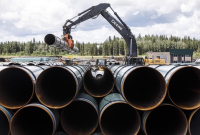Support strong Canadian climate journalism for 2025
The federal environment minister is backtracking on a previous decision to keep Ottawa out of the approval process for a major coal mine expansion in Alberta.
The existing Vista mine, which is owned by the U.S. coal giant Cline Group, began shipping coal for export in May 2019 and the company is now looking to double, or possibly even triple, its output.
Minister Jonathan Wilkinson declined in December to order a federal impact assessment of the project near Hinton, saying the potential risks to the environment and Indigenous rights would be dealt with by a provincial approval process.
Dozens of environmental, Indigenous, health and faith-based organizations wrote to Wilkinson this month asking him to take a second look at the expansion.
In a decision Thursday supporting a federal designation for the project, Wilkinson says the expansion may cause "adverse direct and cumulative effects" on areas of federal jurisdiction, such as fish and fish habitat, species at risk, and Indigenous peoples.
The decision also notes that the mine expansion would produce more than 18,600 tonnes of coal per day, which is above the total production capacity threshold of 5,000 tonnes per day in regulations of the Impact Assessment Act.
"The minister acknowledges that, cumulatively, the projects may result in adverse effects of greater magnitude to those previously considered," the decision reads.
"(Those effects) may not be mitigated through project design or the application of standard mitigation measures."
In 2017, Canada and the United Kingdom jointly launched the Powering Past Coal Alliance, aiming to convince the world's wealthiest countries to eliminate coal as a source of electricity by 2030, and the rest of the world to do so by 2050.
When the alliance began, Prime Minister Justin Trudeau called coal "the dirtiest of all fossil fuels.''
"Let me be very blunt about this. Coal represents perhaps the greatest challenge to the world not meeting its climate-change targets,'' Trudeau said. "Unless we reduce coal consumption, we are not going to be able to prevent catastrophic global warming.''
This report by The Canadian Press was first published July 30, 2020





Comments
This is an acknowledgement that decisions made by provinces around resource extraction have country-wide and world-wide environmental and climate implications.
The type of coal is not mentioned in this piece, which the NO evidently took directly off the CP wire. Nor is it defined in a major piece on Vista in the journal “Mining Technology” which seems to be exclusively about engineering and machinery without regard for physics, ecosystems or policy.
I had to find it in The Narwal, which supplied a wealth of information:
“… the Vista coal mine, reportedly among the largest so-far undeveloped coal mines in the entire country and potentially one of the largest in North America.
“The project just barely avoided a federal environmental assessment thanks to some last-minute tweaks to numbers — leading some to question Ottawa’s process for exempting coal mines from federal review.
“Vista produces thermal coal — coal burned to produce electricity, as opposed to metallurgical coal, which is used in steel production.
“And while coal-fired electricity is being phased out in Canada, the coal mined at Vista will be exported and burned elsewhere — so the phaseout doesn’t apply.
“Still, on the world stage, the federal government has taken an active lead in encouraging businesses and governments abroad to cut back on coal-fired electricity.
“It’s like getting a temperance lecture from the bartender,” Clark Williams-Derry, a Seattle-based energy finance analyst with the Institute for Energy Economics and Financial Analysis, told The Narwhal of Canada’s actions to discourage the global reliance on coal, whilst increasing our own exports.
“As he’s pouring the drink, he’s saying ‘you really shouldn’t be drinking so much,’ ” he said.
“The world knows [the Canadian government] hasn’t put their money where their mouth is.”
https://thenarwhal.ca/heres-what-you-need-to-know-about-the-vista-mine-…
Thermal coal is the most dangerous fossil fuel ever burned. It has killed hundreds of millions of people over the past 200 years, and billions more are at risk from this primary progenitor of climate change, exacerbated today by big secondaries like refined petroleum fuels in the form of liquid or gas.
For five years now we’ve heard the federal Liberals loudly proclaim that they are fighting climate change while taking forever to first impose delay, then slowly enact each baby step submerged in meaningless talk. Concurrent with that, they worked up a real sweat while they bought, approved or continued to pedal fossil fuel projects.
The $4.5B existing Trans Mountain pipe with an attached $8B expansion pipe is but one. Keystone is still “hopeful” in one of this week’s opinions by the federal Natural Resources minister, who denied that the climate fighters in cabinet have any real sway. The years-old Ports Canada export contract to allow the transit through BC of thermal coal from Wyoming to the Roberts Bank superport is another. Now Vista, which will likely require an expansion of the Ridley Island Terminal in Prince Rupert, another federal port facility.
It’s now evident that the public should follow the money, and not pay any further attention to weak leaders like Trudeau or ideologues like Kenney. Two days ago Total, the French petroleum giant (one of the Big Five), pulled out of the oil sands and wrote down almost $10B in investment. Moreover, their stated reasoning was all about long term investments in the face of the world’s increasing motivation to act on climate change. Eat that, federal cabinet. The private investments in electric vehicle plants by all the car-making majors is nearing a trillion Euros, with hundreds of billions to follow for EVs and renewables in the post pandemic economic strategy recently approved by Brussels. Oh, the demand destruction for carbon will be either magnificent or tragic, depending on one’s perspective.
Fossil fuel interests will fight back of course, not the least by playing dirty, but it is ever more evident that the tide is now rapidly changing. It’s pathetic how Canada cannot officially change with it through policy, although unofficially private citizens are giving the finger to fossil fuel companies one Tesla, one heat pump and one LED light bulb at a time, and the governments that subscribe to their donations while mouthing saccharine platitudes about climate. Sales of EVs have doubled in BC over last year alone, and that’s even during a pandemic.
The momentum is building.
thanks for the cheering information. I call it my happy schadenfreude news every time I read about another divestment or withdrawal of insurance to the fossil fools. My deepest revenge dream would be KKKennney getting thrown in jail for treason in the republic of Alberturda
I also am getting alarmed by the increasing number of softball, propaganda fossil pieces reprinted here from CP. Might cancel my subscription and put money to Narwhal instead. ( Are you listening NO?)